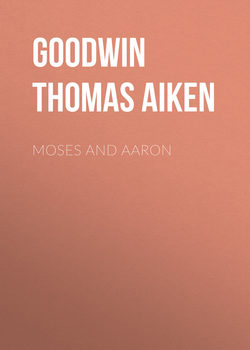Читать книгу Moses and Aaron - Goodwin Thomas Aiken - Страница 16
THE SECOND BOOK
TREATETH OF PLACES
CHAP. II.
Their Synagogues, Schools, and Houses of Prayer
ОглавлениеThe word Synagogue is from the Greek, συνάγω to gather-together; and it is applyed to all things whereof there may be a collection, as συναγωγὴ γάλακτος, copia lactis, συναγωγὴ πολέμοιο; collectio quæ sunt ad bellum necessaria. God standeth in Synagoga Deorum, the Assembly of Judges: but Synagogues are commonly taken for houses dedicated to the worship of God, wherein it was lawful to pray, preach, and dispute, but not to sacrifice. In Hebrew it was called, בית הכנסת Beth Hacneseth, the House of Assembly. The Temple at Jerusalem was the Cathedral Church; the Synagogues, as petty Parish Churches belonging thereunto.
Concerning the time when Synagogues began, it is hard to determine. It is probable that they began when the Tribes were settled in the promised Land. The Temple being then too far distant from those which dwelt in remote places, it is likely that they repaired unto certain Synagogues instead of the Temple. That they were in David’s time appeareth; They have burnt all the Synagogues of God in the land, Psal. 74. 8. And Moses of old time had in every City, them that preached him, being read in the Synagogues every Sabbath day, Act. 15. 21.
In Jerusalem there were208 four hundred eighty Synagogues, besides the Temple; partly for Jews, partly for strangers: one for strangers was called the Synagogue of the Libertines, Act. 6. 9. Whence it had that name, whether from the Roman Libertines, such as had served for their freedom, being opposite to the Ingenui, those that were free-born; (for many of those Libertines became Proselites, and had their Synagogues209) or whether it were from Lubar,210 signifying an high-place; (for as their Temple, so their Synagogues and Schools were built on hills and high-places) because it is said, Prov. 1. 21. Wisdome calleth in high-places: I leave to the judgment of the Reader.
Out of Jerusalem, in other Cities and Provinces, were many Synagogues: there were Synagogues in Galilee, Mat. 4. 23. Synagogues in Damascus, Acts 9. 2. Synagogues at Salamis, Act. 13. 5. Synagogues at Antiochia, Acts 13. 14. Yea, their tradition is that211 Wheresoever ten men of Israel were, there ought to be built a Synagogue.
Their Synagogues had212 many Inscriptions; over the gate was written that of the Psal. 118. 20. This is the gate of the Lord, the righteous shall enter into it. In the walls, these and the like sentences; Remember thy Creator, & enter into the house of the Lord thy God in humility. And prayer without attention is like a body is like a body without a soul. And silence is commendable in time of prayer.
As the Courts of the people before the Temple were distinguished by a wall into two rooms, the one for men, the other for women: so in the Synagogues, the women were separated from the men,213 by a partition of Lattice, or wire-work.
In the Synagogues the Scribes ordinarily taught, but not only they, for Christ himself taught in them, &c. He that gave liberty to preach there, was termed ἀρχισυναγώγος. The Ruler of the Synagogue. There was also a Minister who gave the book unto the Preacher, and received it again, after the Text had been read. Christ closed the book, and gave it again unto the Minister, Luke 4. 20. This is probably he, whom they called שליח צבור Sheliach Tsibbur, the Minister or Clerk of the Synagogue.
Their Schools were different from their Synagogues. Paul having disputed for the space of three months in the Synagogue, because divers believed not, but spake evil of that way, he departed from them, and separated his Disciples, disputing daily in the School of one Tyrannus; Act. 19. 8, 9, 10.
Their School sometimes is called בית Beth, an house, simply, as appeareth by that saying;214 Octodecim res de quibus contentio fuit inter domum Sammai, & domum Hillel, ne Elias quidem abolere posset. Those 18 matters controverted between the house of Sammai, and the house of Hillel, Elias himself could not decide; that is, between their two Schools. Sometime it is called בית המדרש Beth Hammidrasch, an house of subtle and acute exposition. Here points were more exactly and punctually discussed, than in the Synagogue, or Temple; whence they held it a profounder place for exposition, than the Temple: To this purpose tend those sayings,215 They might turn a Synagogue into a School, but not a School into a Synagogue, for the sanctity of a School is beyond the sanctity of a Synagogue. And that groweth from Vertue to vertue, Psa. 84. 7. they interpret216 a kind of promotion, or degree, in removing from their Temple to their School. In their Temple, their Sermons were, as it were, Ad populum; in their Schools, Ad Clerum.
As they had Synagogues, so likewise Schools, in every City and Province; and these were built also upon hills. There is mention of the hill Moreb, Judg. 7. 1. that is, the hill of the Teacher.
The Masters when they taught their Scholars, were said to give: Give unto the wise, and he will be wiser, Prov. 9. 9.
The Scholars when they learned any thing, were said to receive it: Hear my Son, and receive my words, Prov. 4. 10. Hence is that of the Apostle: This is a true saying, and by all means worthy to be received
208
Sigonius de rep. Hebr. l. 2. cap. 8.
209
Philo in legat. ad Caium.
210
Vide Tremel. Acts 6. 9.
211
Maimon. in Tephilla. c. 11. Sect. 1.
212
Buxtorf. de abbreviatur. pag. 23. 81. 174.
213
Talmud in tract. Suta cap. ult. vi. Buxtorf. Synag. c. 9. p. 240.
214
Drusius de tribus sect. l. 2. c. 10.
215
Maimon. Tephilla. c. 11. Sect. 14.
216
Paraphrast. Chal. in hunc locum.
